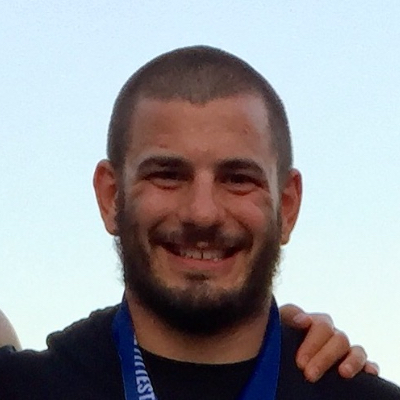What does training for half a dozen years do to a person’s fitness?
The last workout of the 2018 Open, picked from three options by the CrossFit community, was an ascending ladder of thrusters and chest-to-bar pull-ups, a repeat of the final Open workouts in 2011 and 2012.
Open Workout 18.5 allowed all the athletes who completed 11.6 and 12.5 an opportunity to compete against their former selves.
The Women
In 2012 Camille Leblanc-Bazinet won 12.5 with a score of 173. This year, 29-year-old Leblanc-Bazinet improved on her 2012 score by 26 reps, finishing with 199 reps and tying for second with fellow Canadian Carol-Ann Reason-Thibault.
The winner of 18.5 for the women was the only athlete to break the 200 barrier. Kara Saunders climbed up the ladder so rapidly she made it to 24 thrusters, completed all of them, and then got in nine chest-to-bar pull-ups before the seven minutes expired. She finished with a score of 201, and the win bumped her up to second place overall in the Open and first in the Australasia region.
Cassidy Lance-McWherter, the four-time Games athlete who finished 12th in 2017, won the 2018 Open for the women. Lance-McWherter never won a workout but had three top-10 finishes. In 2016 she missed qualifying for the Games by 9 points at the Atlantic Regional but came back and placed fifth in the world in the Open. She then won the Atlantic Regional in 2017. This year, she topped that feat and won the worldwide Open.
In third place overall is Carolyne Prevost, a professional hockey player who has competed at Regionals every year since 2013 but never qualified for the Games. In 2017 she finished 10th at the East Regional to post her best finish.
All three Icelandic women who completed 18.5 at the Open announcement at CrossFit Reykjavík kept their scores from Thursday night. Annie Thorisdottir, Katrin Davidsdottir and Sara Sigmundsdottir know the end goal is the Games, and all three women easily qualified for their respective Regionals. Thorisdottir finished fifth in the world in the Open, Davidsdottir eighth, and Sigmundsdottir 20th.
Female Open Winners
1. Cassidy Lance-McWherter
2. Kara Saunders
3. Carolyne Prevost
The Men
In 2017 Mat Fraser was irritated when he won the Open. That wasn’t the plan.
He wanted to qualify for Regionals, qualify for the Games and then get his big win at the Games. Instead, he managed a trifecta, winning the Open, his Regional and the Games.
Perhaps Fraser realized winning the 2017 Open didn’t hurt his performance at the Games, so he decided to take the Open win again this year.
Fraser won 18.5 with a score of 198 reps—his only win of the 2018 Open—and finished the five-week competition 340 points ahead of second-place Alex Vigneault. Fraser won the Open just like he won the 2017 Games: definitively and with no room for error.
In 2011 Josh Bridges won 11.6 with a score of 169 reps, taking second in the Open and then standing on the podium in second place at the 2011 Games. Seven years later, Bridges improved on his score by 23 reps for a total of 192 reps. He took second worldwide in 18.5.
Third place on 18.5 went to 28-year-old Darwin Perez, who now sits just below Mat Fraser in the Central East. In 2017 Perez elected to compete with his affiliate’s team, and Team Maximus qualified for the Games and placed 22nd.
Vigneault, in second overall, is a two-time individual Games athlete from Canada who took third in the 2017 Open but withdrew from last year’s East Regional due to an injury suffered in training.
Willy Georges, an athlete from France competing in his third Open, finished this year’s competition in third place overall. This will be Georges’ first time competing at Regionals.
Male Open Winners
1. Mat Fraser
2. Alex Vigneault
3. Willy Georges
Teens and Masters
Haley Adams doesn’t have an official score for 12.5—she was only 11 years old at the time.
This year 17-year-old Adams took on the thrusters and pull-ups in 18.5 and scored 177, one rep more than two-time CrossFit Games champ Davidsdottir. Right behind Adams in second was Kaela Stephano, with 168 reps.
Stephano placed no lower than sixth throughout the five weeks of the Open, finishing in first overall for Girls 16-17 and qualifying for the individual women in the South East, like last year. Stephano won the 14-15 Division at the 2016 Games and then moved up and won the 16-17 category at the 2017 Games. When she moves up into the individual women’s field next year, Stephano will bring years of competition experience and a background in dance and weightlifting—she was the National Youth Weightlifting Champ in 2016.
David Hippensteel continued his dominance of the 60+ Division, winning 18.5 with a score of 166 reps, 14 reps over the second-place finisher. This is the second win in the Open for Hippensteel, placing him in first overall.
The winner for the 60+ women is 62-year-old Karen Miller from Australia, with a score of 144 reps. Miller placed fourth in the 60+ Division at the 2016 Games.
Bill Grundler, former individual Games competitor and CrossFit Games announcer, won 18.5 in the 45-49 Division with a score of 159 reps. Grundler, 49, also finished first overall in his age group. Two spots below Grundler in third overall is his 47-year-old brother, James Grundler.
The top 200 masters and teenagers from each division worldwide will go on to compete in a four-day online qualifier starting on April 19. The top 20 fittest masters and teenagers from every division will advance to the Games.
Individual and team athletes will compete at local Regionals worldwide over three weekends from May 18 to June 3.
The CrossFit Games start on Wednesday, Aug. 1, and conclude on Sunday, Aug. 5.








